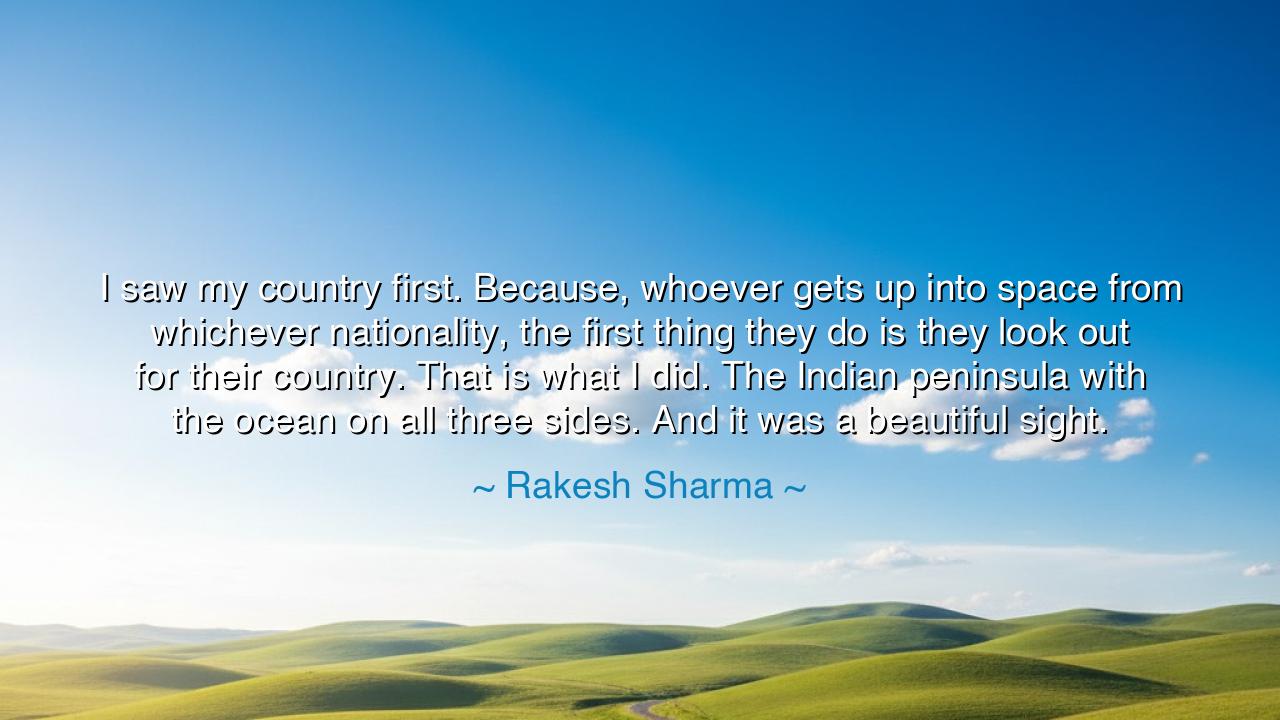
I saw my country first. Because, whoever gets up into space from
I saw my country first. Because, whoever gets up into space from whichever nationality, the first thing they do is they look out for their country. That is what I did. The Indian peninsula with the ocean on all three sides. And it was a beautiful sight.






Hear the words of Rakesh Sharma, the first son of India to rise into the heavens, who spoke with reverence and love: “I saw my country first. Because, whoever gets up into space from whichever nationality, the first thing they do is they look out for their country. That is what I did. The Indian peninsula with the ocean on all three sides. And it was a beautiful sight.” In this declaration, he reminds us of the enduring bond between the human heart and the land of its birth. For even amidst the vastness of the cosmos, it is the sight of one’s homeland that first pulls at the soul.
The origin of this saying lies in Sharma’s journey in 1984, when he became the first Indian to travel into space aboard the Soviet spacecraft Soyuz T-11. As he gazed through the window of the capsule, he did not first see galaxies, nor abstract horizons, but the Indian peninsula, cradled by the seas, shining like a jewel upon the earth. It was not calculation or reason that drew his gaze, but instinct, love, and belonging. For the soul, even when lifted beyond gravity, is bound to its roots.
This truth is not for Sharma alone, but for all explorers. When Yuri Gagarin, the first man in space, looked down upon Earth, he too marveled at his homeland, though he saw a planet without borders. The same has been said by American astronauts, by cosmonauts, by all who have risen skyward: before the grandeur of stars, their eyes searched for the familiar contours of the soil that had nurtured them. Thus Sharma’s words carry a universal truth—that in the infinite, the finite homeland shines brightest.
Consider also the story of Odysseus, who wandered for ten years across strange seas, tempted by lands more fertile, kingdoms more splendid, and comforts more alluring. Yet always his heart yearned for Ithaca, his small and rocky homeland. It was not the grandness of the world that sustained him, but the memory of his own country, where his soul had first taken root. So too with Sharma: amidst the glory of the cosmos, it was India, embraced by her oceans, that appeared to him as the most beautiful sight.
The emotional power of this quote lies in its fusion of the vast and the intimate. Sharma stood among the stars, gazing upon Earth as few have ever done. He saw continents, oceans, and the whole globe itself suspended in the void. Yet what stirred his spirit was not the immensity, but the sight of his country, that piece of Earth where his people dwelled, where his ancestors had lived and died, where his own story began. This is the paradox of human love: that in the face of infinity, the heart clings first to the small circle it calls its own.
The lesson for us is clear: never forget your roots. However high you rise, however far you travel, however much of the world you conquer, let your eyes turn first to your homeland—the soil that nurtured you, the people who gave you life, the traditions that shaped you. To honor your country is not to despise others, but to carry within you a love so deep that it grounds you even amidst the stars. The greatness of exploration is not to leave behind your homeland, but to carry it into the heavens with you.
So let your practice be this: when you achieve, remember who gave you strength. When you rise, look back upon the earth and honor the place you first called home. And when you dream of the stars, do not dream only for yourself, but also for your people. For as Rakesh Sharma teaches, in the infinite expanse of space, the first thing a true soul seeks is the sight of its country—and in that moment, the personal becomes universal, and the love of one land becomes a hymn for all mankind.






AAdministratorAdministrator
Welcome, honored guests. Please leave a comment, we will respond soon